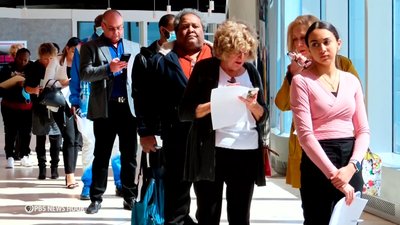Summary
As negotiations continued over President Biden’s infrastructure and social spending plans, a stalemate in the Senate blocked a Democrat-backed voting protection bill this past week. This comes as several states are changing laws to limit access to polls, reduce mail-in voting and redraw congressional maps. Judith Browne Dianis, executive director of civil rights organization Advancement Project, joins. Note: The Voting Rights Act of 1965, discussed in this piece, set out a number of rules to help address voting suppression and discriminatory voting laws, including allowing the federal government to approve changes to state voting laws. For more background on the VRA and how it has changed over the years, see this article from NPR.Five Facts
- Who is interviewed for this piece and what is her background?
- What are some of the major concerns about voting rights and new state level voting laws expressed in this interview?
- When did Congress vote on updating voting laws, and what was the outcome?
- Why does Judith Browne Dianis think "democracy is in peril" without stronger voting rights laws?
- How are some states changing voting laws since the 2020 election?
Focus Questions
Do you think the rules for how national elections work should be the same in every state? Why do you think some argue that states should be able to decide for themselves how to conduct national elections, including whether or not voters or state legislatures vote for the president of the United States? Media literacy: Was it clear from this interview what problems with election laws are most dangerous to democracy, according to the expert? What more information would you want to have?For More
- See this story for more on ways the Supreme Court has loosened the power of the Voting Rights Act over recent years.
- This full lesson plan takes a close look at the sorts of new state level voting laws that some worry are a return to an era of voter suppression and the erosion of the Voting Rights Act.





